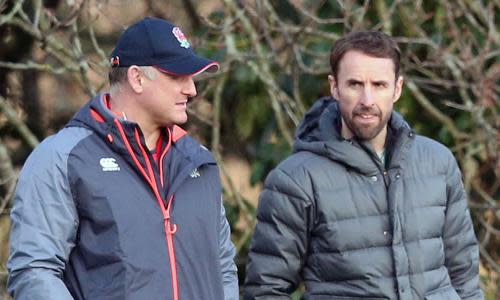Six Nations: Eddie Jones looks for an inside line as England prepare to face Scotland

Eddie Jones and his England assistants will pick the brains of one of Scotland’s highest-profile football coaches by welcoming David Moyes behind enemy lines on Tuesday in preparation for the Calcutta Cup match on Saturday.
Moyes, the West Ham manager, along with his assistant Stuart Pearce, the former Spurs striker Les Ferdinand and the former England Women’s and current Brighton coach, Hope Powell, will all attend training at Bagshot before sitting down for a Q&A session four days before Jones takes his side to Murrayfield.
Jones has spoken recently of his admiration for how Moyes has set about rebuilding his career at West Ham following turbulent periods in charge of Manchester United, Real Sociedad and Sunderland after he had established his reputation at Everton. Jones has often called on football coaches previously, having arranged similar meetings with the Chelsea manager, Antonio Conte, and Manchester City’s Pep Guardiola when he was with Bayern Munich. Gareth Southgate, the national manager, visited an England training session during the Six Nations last year.
READ MORE: Six Nations - Biggar, Halfpenny and Faletau all fit as Wales given clean bill of health
READ MORE: Six Nations - Hughes availability ‘absolutely huge’ for England, says Alphonsi
READ MORE: Six Nations - Returning Ringrose added to Ireland Six Nations squad
Jones often talks of how he utilises the training method of “tactical periodisation”, a theory described previously as José Mourinho’s best kept secret, and before the season he visited Newcastle United’s academy, where he explained his keen interest in the sport. “The thing that really impresses me about football, which hasn’t really happened in rugby so much, is that the players are individually highly skilled,” he said. “Rugby has improved a lot – having been professional for only 20 years – but the skill level has not improved so much and that is something which really interests me.”
Jones has also been critical of how England’s footballers have succumbed to a “fear of failure” at major competitions. England’s rugby players flopped spectacularly at the 2015 World Cup but since Jones took over they have won 24 of their 25 Tests, clinching the Six Nations title for the past two years.
“I am sure there is a crossover in terms of sport science,” said the hooker Jamie George. “I know our sport scientists are very interested when [football coaches] come in, in terms of the GPS data they produce and how they measure the heart rate and all the rest of it.
“It’s anything with regards to what culture they are trying to produce, how they deal with setbacks. Whatever we’re going through at the minute, anything we can learn from them, we’ll take from them. [Footballers] are definitely under the microscope, they have to deal with a lot of pressure. Just like we do. There’s a lot of hype around the Six Nations, that’s a crossover you can find. I love meeting new people and trying to learn from those guys.”
George has fond memories of Murrayfield, having arrived off the bench during a 15-9 victory in England’s first match under Jones in 2016. Four years before that, George was in the Murrayfield crowd for a friend’s 21st birthday to watch his Saracens team-mate Owen Farrell make his Test debut.
The question marks over Farrell’s fitness after he and Joe Launchbury were absent from an open training session at Twickenham last week were removed when England declared a clean bill of health for the Scotland game.
“I’m very lucky to work with [Owen] day in, day out,” George added. “We grew up together, we started playing together when we were 14. His maturity is the main thing that he’s worked on. He’d say himself that he was pretty raw when he first started international rugby but the way he’s developed as a leader and as a player – he’s showing that he’s one of the best players in the world. We’re very lucky to have him for club and country.”

 Yahoo Sport
Yahoo Sport 





































